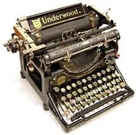
Between the ages of about eight to ten years old I stayed with my grandparents during the summers while Mother took graduate Spanish courses in Mexico. Farm life was quieter since Granddad had retired. He had a large aluminum sided garage/barn full of interesting old equipment and an assortment of previously important items. While rummaging there I discovered an old, very large typewriter. Sitting on a back shelf, it was obvious it had not been used in many years. I was intrigued.
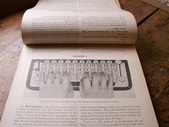
I also found an old copy of a touch typing instruction manual. It was hard backed and the pages flipped from bottom to top so that it could stand upright on the desk, beside the typewriter. I began using the keyboard page to learn the proper finger placement. There were drills in the book to practice moving your fingers about the board in a systematic manner, such as d-e-d, k-i-k, f-v-f, and so on. Over the summer I practiced and practiced those drills on the picture, even stretching my long fingers up to the number row. At some point my grandfather let me try out the old typewriter.
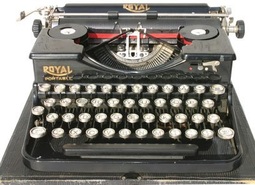
After my mother returned from Mexico, she allowed me to use her more "modern" portable Royal typewriter to practice. It was made to lock securely into a black hard covered case. The machine could be unlocked and lifted out of the case bottom to be set on a desk or table. The Royal ribbon invention was quite practical. There was a special knob that allowed you to switch from the upper level of ribbon to the lower level - the whole width of which was about 1/2". Being able to type on both rows of ribbon meant you didn't have to change ribbons as often. I was thrilled to use this typewriter, especially when we had ribbon that was half black ink and half red ink. I became quite good at touch typing and my speed picked up. Sometimes I practiced with my eyes closed, as the instruction manual suggested. Mother had me repeat typing, "Now is the time for all good men to come to the aid of their country" and the pangram (all 26 letters of the alphabet) "The quick brown fox jumps over the lazy dog."
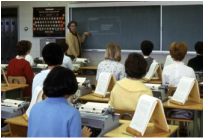
When electives were available in junior high school, my mother encouraged me to take typing. She felt it would be invaluable for college. Our typewriters were newer than Mother's Royal, but they were still manual, requiring you to sweep the return bar from right to left when you finished a line of typing. As you typed near to the end of a line, a bell tinkled to let you know you were running out of space. Since I was already familiar with typing, I won many of the speed drills. The teacher would have us turn to a specific page in the manual. She would start a 1 or 2 minute timer. We typed from the book as fast as we could, trying not to make mistakes because at the end we had to deduct the mistakes from our overall time.
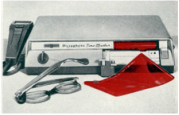
My first paying job was as a clerk over the summer break in my Junior year. I was able to work at State Farm Insurance in their Employee Child Program, thanks to my dad. I had my own desk and files were routed to me for proofing and sorting. It was a great experience that helped me get my foot in the door for a job after high school. I had to take a speed test to be placed as a typist, and did well. Those new employees that could not type worked as file clerks. I was a dictaphone typist using an electric typewriter, working for one year to save money for college. Transcribing from a dictaphone took a little practice. The underwriters would dictate letters into their machines which recorded on bright blue plastic "dictabelts." They dropped the belts off at my desk, and I listened to the recordings with headphones. Using foot pedal controls, I could go forward, backwards, slow, or fast to complete the typing. Most were letters to policy holders, making multiple copies on thin carbon-ready paper. If you made a mistake, you had to correct the top white copy (we had Correction Paper) AND erase all the carbon copies. Note: we did not have much access to xeroxing at this time which is why all the carbon copies were required. Sometimes it was easier to just start over if there were several mistakes but it seemed a terrible thing to waste all those layers of paper and carbon. There was one underwriter who had a thick Southern accent and he spoke really fast. It was quite difficult to understand him, and on more than one occasion I would have a letter completely painstakingly done and at the end of the recording he would say, "cancel this letter!"
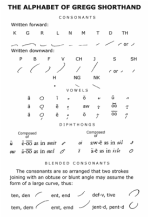
In high school I also took Shorthand. We learned Gregg shorthand which was a combination of commas and straight lines, each stroke representing an English sound or word. There were timed drills just as in typing class. The teacher would dictate a letter and afterwards we would have to type out what we had sketched. There were many blank spaces for those symbols we couldn't read or for words we missed. I never really used shorthand in college or in any of my secretarial jobs. But it was fun to learn, like knowing a secret code.
On summer breaks from college I returned home and worked as an office Temp travelling to fill in at various businesses for short periods of time. It was a challenge to step into an office without knowing the people or routine, only to just about get it figured out when I would have to move on to another place. Three longer term positions were at Blue Cross/Blue Shield, the Maxwell House Coffee Plant, and Avis Rent-A-Car at the airport. All the jobs required some typing, so I was grateful to have that skill.
On summer breaks from college I returned home and worked as an office Temp travelling to fill in at various businesses for short periods of time. It was a challenge to step into an office without knowing the people or routine, only to just about get it figured out when I would have to move on to another place. Three longer term positions were at Blue Cross/Blue Shield, the Maxwell House Coffee Plant, and Avis Rent-A-Car at the airport. All the jobs required some typing, so I was grateful to have that skill.
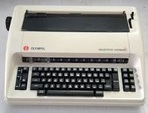
Typing did prove to be necessary during college, especially grad school, for the many research papers my husband and I had to complete. I had purchased an old Royal typewriter in a hard cover case because it reminded me of Mother's first machine. I still have it, and let my children play with it when they were young. Later we upgraded to an electric typewriter with built in correction tape. But really, imagine having to complete a 30 page or so paper without a computer or Word program! If you wanted to change the order of your paragraphs or make edits or additions, you would have to start typing all over. We had to plan ahead for the space required at the bottom of the pages for footnotes as well. Many late nights were spent getting those papers done, beginning with hand written drafts. Those two old typewriters haven't been used in over 10 years and are stacked away in the garage. Just can't part with them yet.
On a sad note, Mother's old machine was stolen by a drifter. She and Daddy had taken him in and set him up in my grandmother's older vacant home, feeling they were doing a good deed finding odd jobs for him. The drifter soon vanished taking several items, including the typewriter. That old model had served my mother well for her own college papers, letters, forms, and church programs and lessons. In her later years she was able to adapt to a computer fairly easily because of her excellent typing skills.
Do you have typing or shorthand memories?
"Show yourself in all respects to be a model of good works." Titus 2:7
On a sad note, Mother's old machine was stolen by a drifter. She and Daddy had taken him in and set him up in my grandmother's older vacant home, feeling they were doing a good deed finding odd jobs for him. The drifter soon vanished taking several items, including the typewriter. That old model had served my mother well for her own college papers, letters, forms, and church programs and lessons. In her later years she was able to adapt to a computer fairly easily because of her excellent typing skills.
Do you have typing or shorthand memories?
"Show yourself in all respects to be a model of good works." Titus 2:7
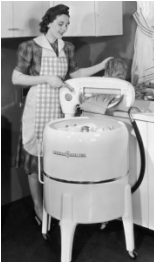
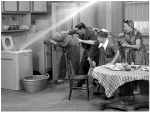
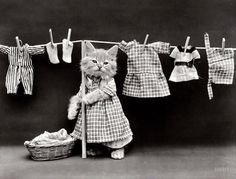

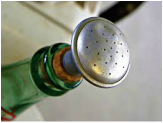
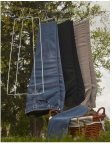





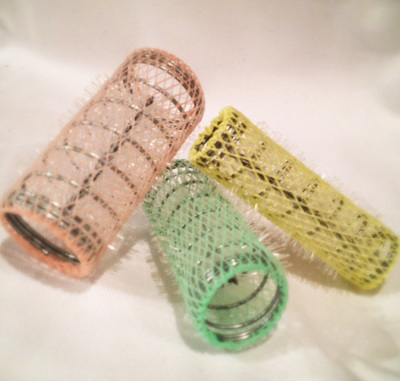

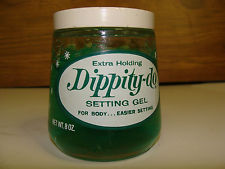
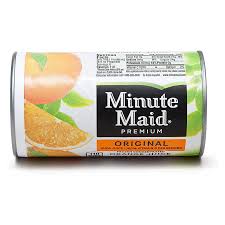
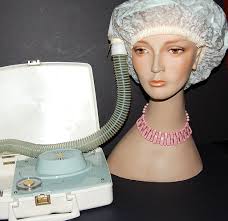
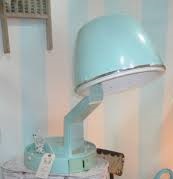
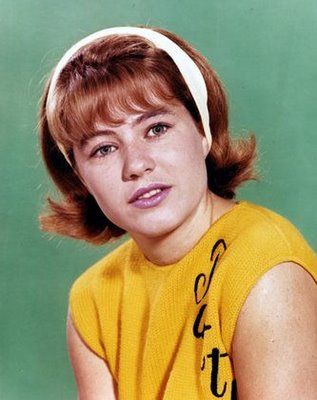
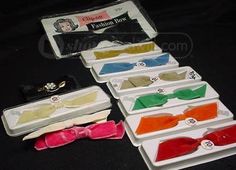
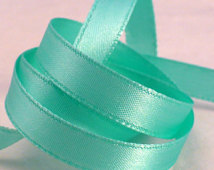
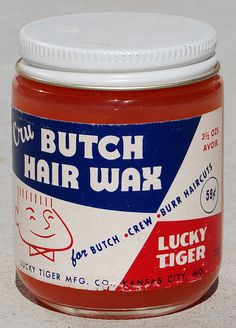
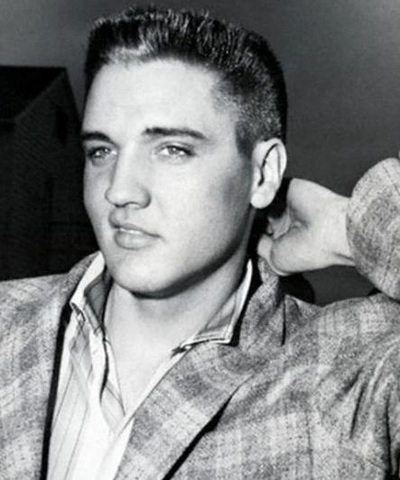
 RSS Feed
RSS Feed
